ENERGY TRANSITION
Pitting non-renewables against renewables downplays the role of fossil fuels in the energy mix, Mantashe tells conference
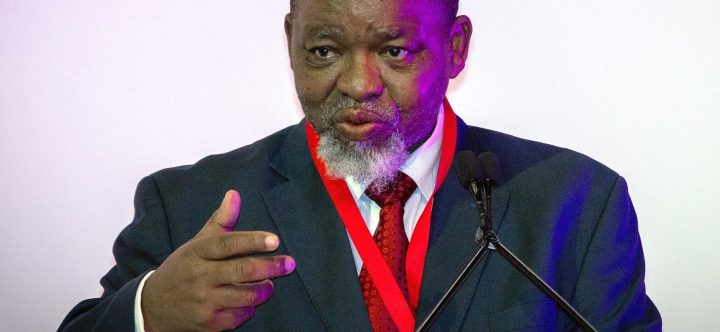
Climate activists and fossil fuel representatives got a chance to state their case either against or for expanding the fossil fuel industry in South Africa as the third annual Southern Africa Oil and Gas Conference got under way in Cape Town on Wednesday.
“One summit after the other, the use of fossil fuels for energy generation is being threatened by some in the energy transition debate. Those who advocate for climate change, continue to pit fossil fuels against renewable energies, and as a result downplaying the role of fossil fuels in the energy mix, while they exaggerate the role of renewable energies.”
So said the minister of mineral resources and energy, Gwede Mantashe, at the third annual Southern Africa Oil and Gas Conference held at the Cape Town International Convention Centre (CTICC) on Wednesday, 13 September.
Concluding his keynote address, Mantashe said, “All of us — no exceptions — are accepting that we must move from high carbon emissions to low carbon emissions. The debate is about the nature of the journey we must travel.”
Outside the CTICC, activists gathered in their numbers, waving placards and flags, calling for an end to the fossil fuel industry while inside, oil and gas professionals in suits and dresses sipped coffee in auditoriums and chatted about how to expand it.
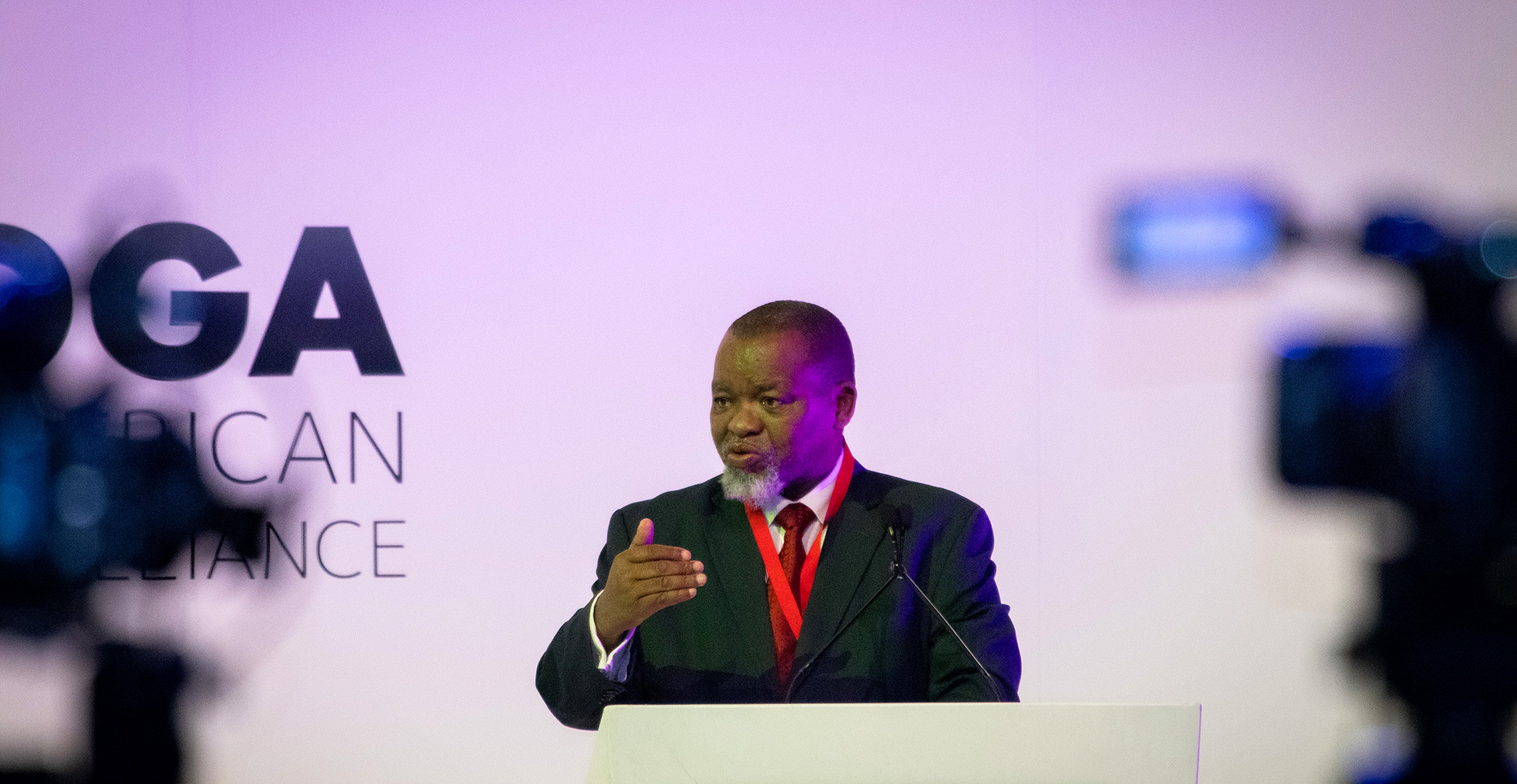
Minister of Mineral Resources Gwede Mantashe speaks at the Southern Africa Oil and Gas Conference in Cape Town, 13 September 2023. (Photo: Ziyanda Duba)
The debate
Representatives of both groups shared their thoughts with Daily Maverick.
Speaking at the conference, Mantashe, whose opinions on the matter are no secret, said that South Africa stood to benefit from the planned R288-billion investments in projects including TotalEnergies’ Brulpadda project in the Western Cape, the Virginia Gas Project in the Free State, the Lephalale Coal Bed project in Limpopo and the Afro Energy project in Amersfoort and Volksrust in Mpumalanga.
The minister, however, neglected to mention the details of how these investments would benefit the ordinary person, particularly in the context of a world wracked by increasingly violent climate impacts.
With a chicken mask atop her head, Judy Scott-Goldman, an activist with Extinction Rebellion, explained how these investments and ones like them would, in her view, not benefit South Africans or the environment.
“All the burning of fossil fuels is really beginning to show [in climate impacts]. It’s causing devastation across the world with floods, droughts, hurricanes, and more. In Libya just yesterday there was a huge flood … It’s causing death and destruction, it’s destroying livelihoods, it’s an enormous economic cost.
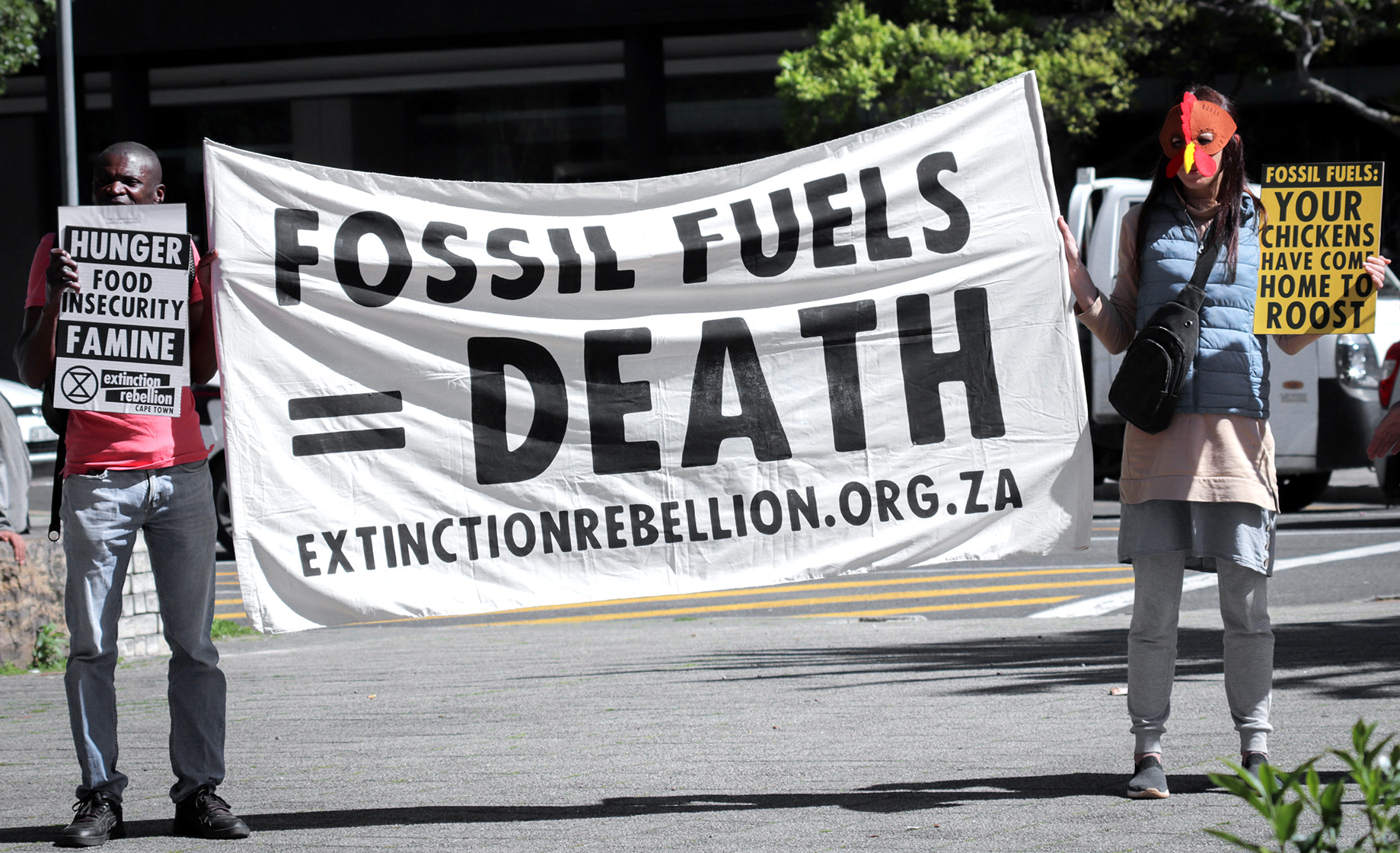
Protesters holding a banner and placards outside the Southern Africa Oil and Gas Conference in Cape Town, 13 September 2023. (Photo: Ziyanda Duba)
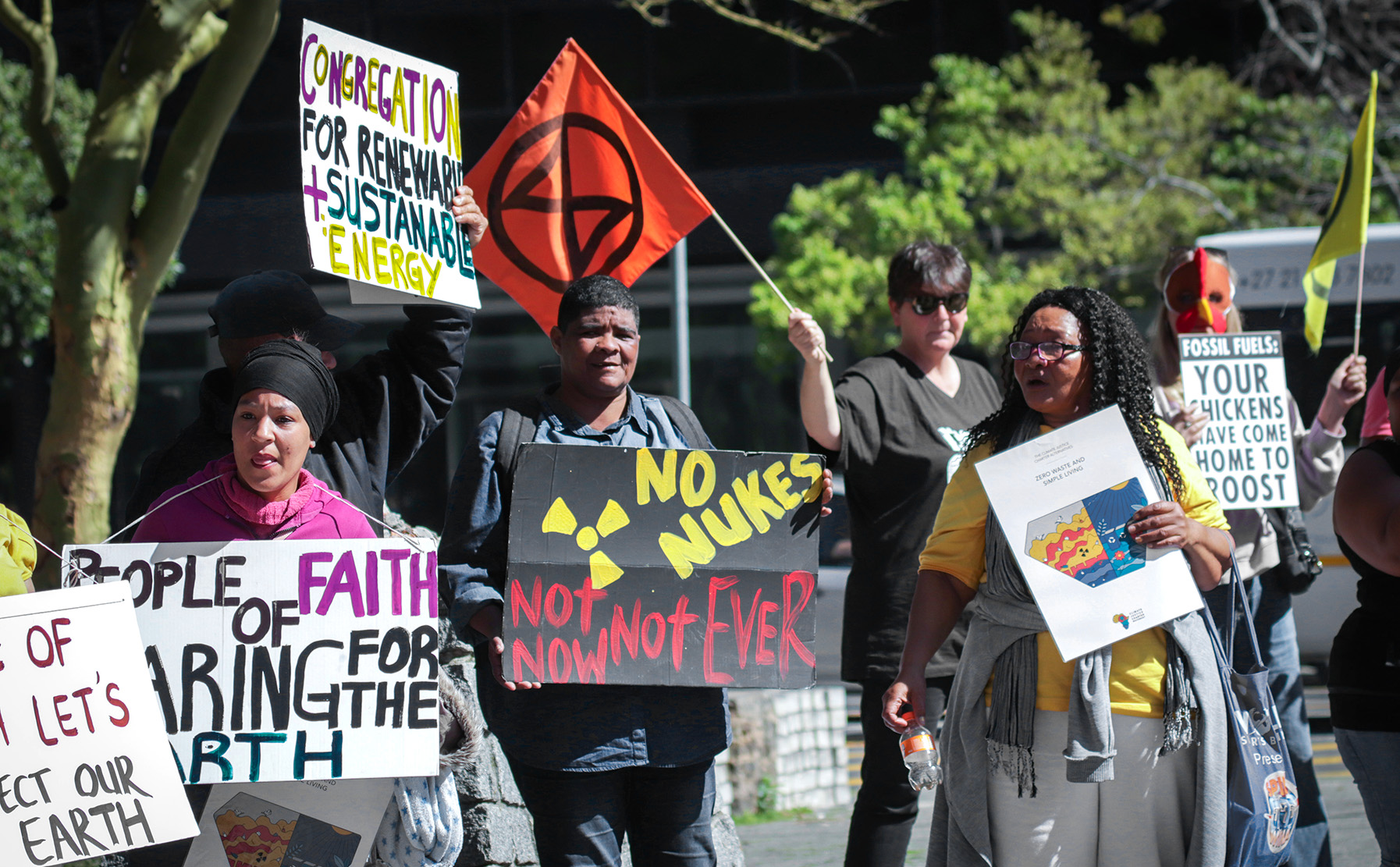
Protesters holding placards outside the Southern Africa Oil and Gas Conference in Cape Town, 13 September 2023. (Photo: Ziyanda Duba)
“Governments of South Africa, Namibia and so on think they’re going to make South Africa wealthy, but if you actually balance out these economic costs now, it’s going to cost way more than what you think you’re going to earn from oil and gas.”
But what of energy security, development and job creation? Are these incongruous with a stable climate? Not according to the Department of Mineral Resources and Energy (DMRE).
Dr Nobuhle Nkabane, DMRE deputy minister, speaking on Wednesday, said that localisation and further development of both discovered and untapped natural gas were key to South Africa achieving its energy and climate commitments.
She said the continued exploration and discovery of indigenous gas “is crucial for meeting our climate change targets and securing of energy supply”, as well as the economic growth of the country.
Adrian Strydom, the CEO of the South Africa Oil and Gas Alliance, said the upstream oil and gas sector could give South Africa energy independence and that as a net importer of oil and gas, South Africa was vulnerable to geopolitical events and oil price fluctuations, which had increasingly been hurting the pockets of South Africans.
But are new fossil fuel investments even necessary to attain energy security or to stave off the impacts of the country’s legacy dependence on hydrocarbons?
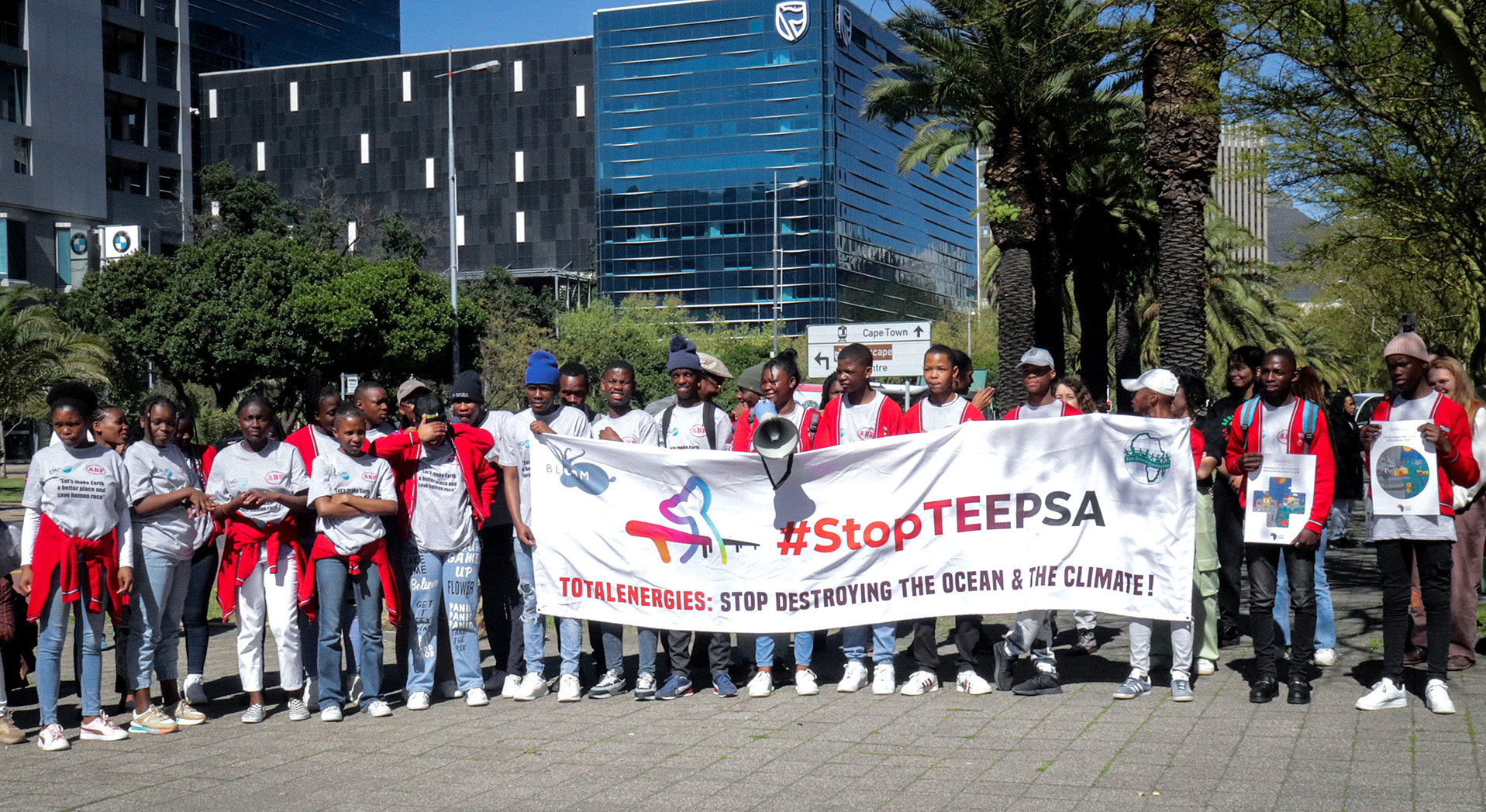
Youth protesters outside the Southern Africa Oil and Gas Conference in Cape Town, 13 September 2023. (Photo: Ziyanda Duba)
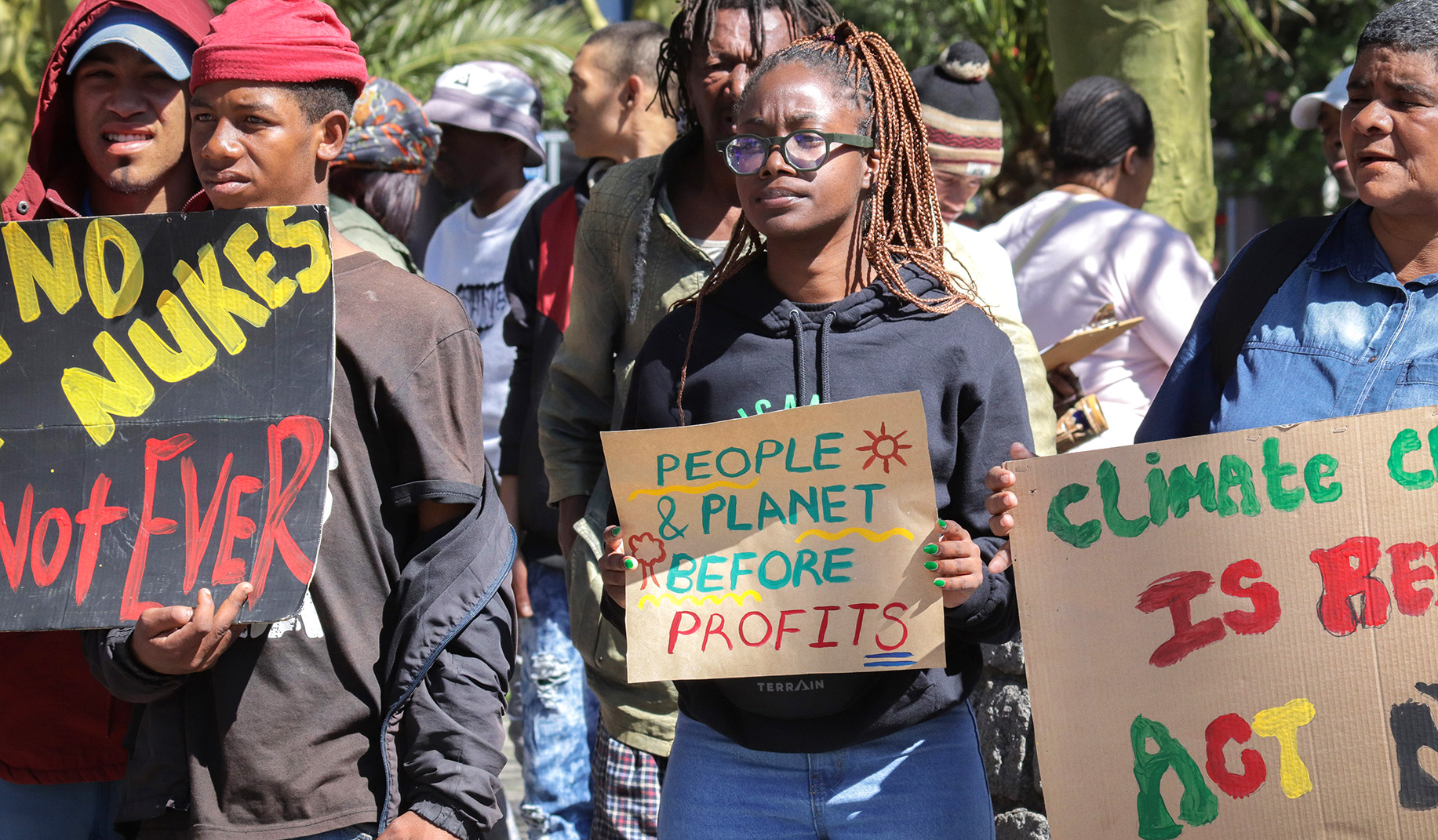
Climate activist protesters outside the Southern Africa Oil and Gas Conference in Cape Town, 13 September 2023. (Photo: Ziyanda Duba)
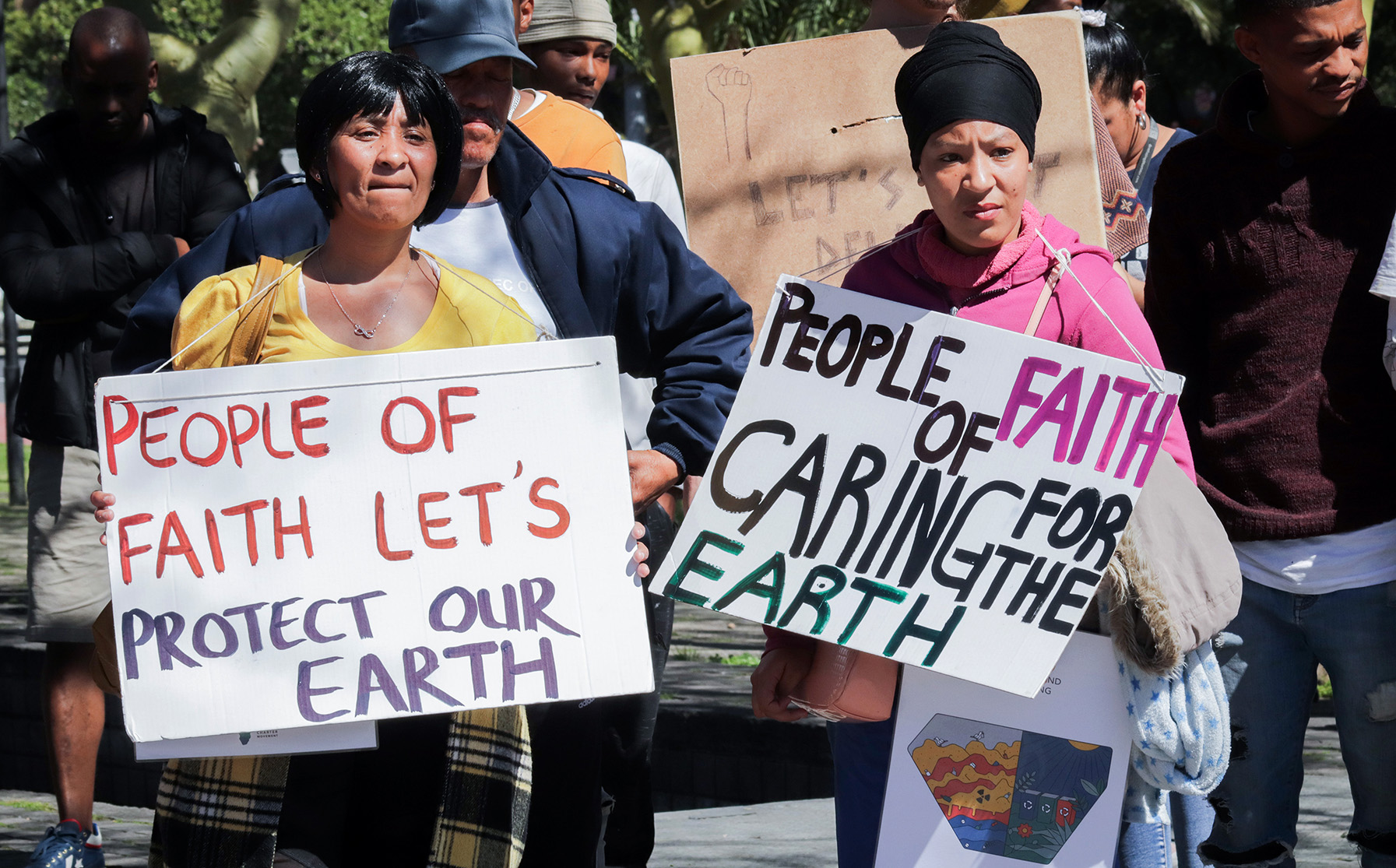
Protesters holding placards outside the Southern Africa Oil and Gas Conference in Cape Town, 13 September 2023. (Photo: Ziyanda Duba)
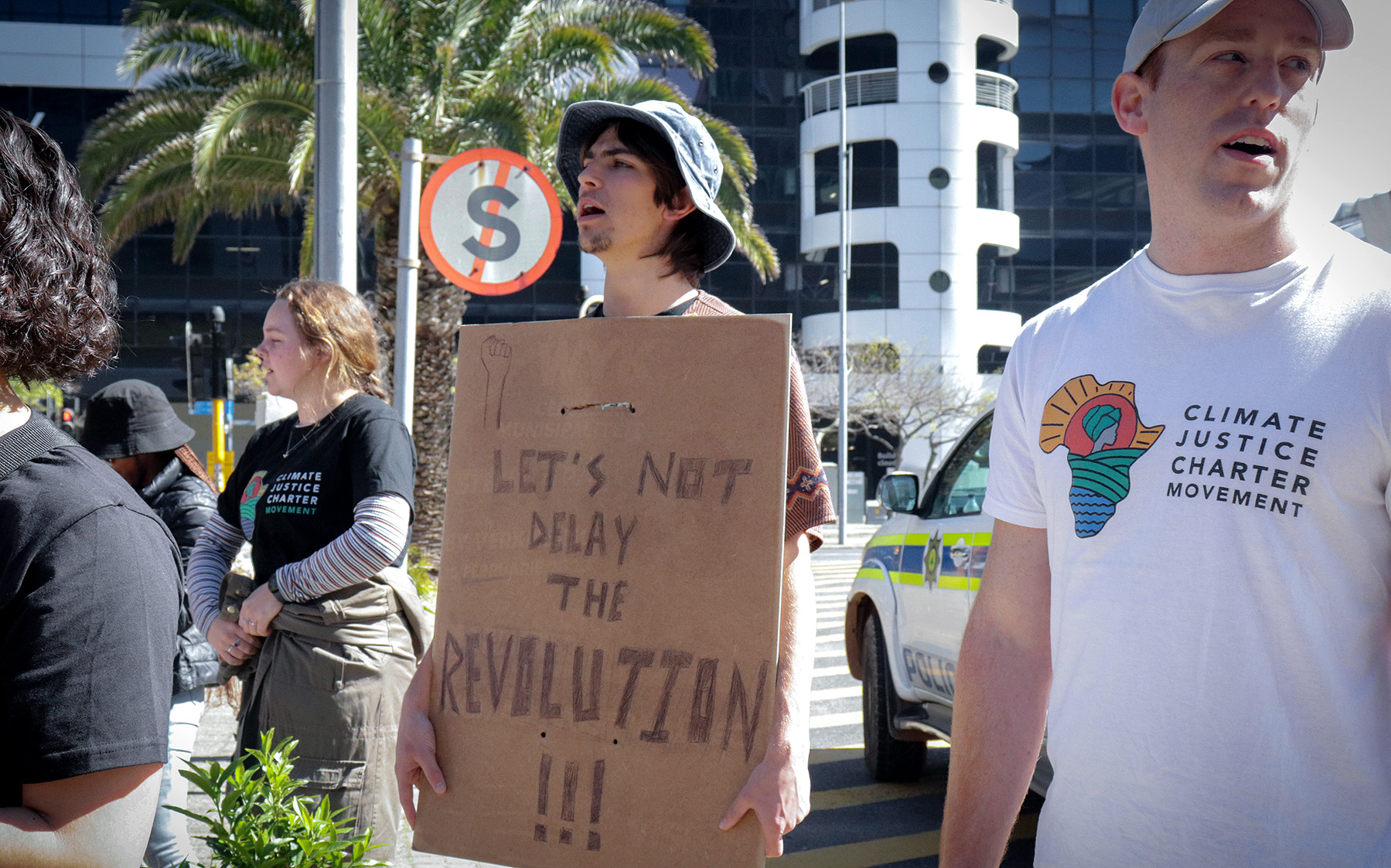
Climate activists call for climate justice outside the Southern Africa Oil and Gas Conference in Cape Town, 13 September 2023. (Photo: Ziyanda Duba)
‘Green jobs’ vs ‘dirty jobs’
Gabriel Klaasen, spokesperson for the African Climate Alliance and Project 90 by 2030, shared his thoughts with Daily Maverick.
“We are calling for the end of fossil fuels, the end of gas and oil, as it is and will continue to destroy lives and livelihoods.”
Klaasen explained that he believes in a truly just transition and that getting people out of pollutive and extractive industries into new positions in “green jobs” is better than creating new “dirty jobs”, not least because renewable energy is faster to bring online than fossil fuel infrastructure, which often takes decades to come online.
The most important message, he said, is that “fossil fuels, oil, gas, coal, are dying industries and unreliable. We see this in load shedding. Renewable energy is not only clean but it is also affordable and it is much more reliable.”
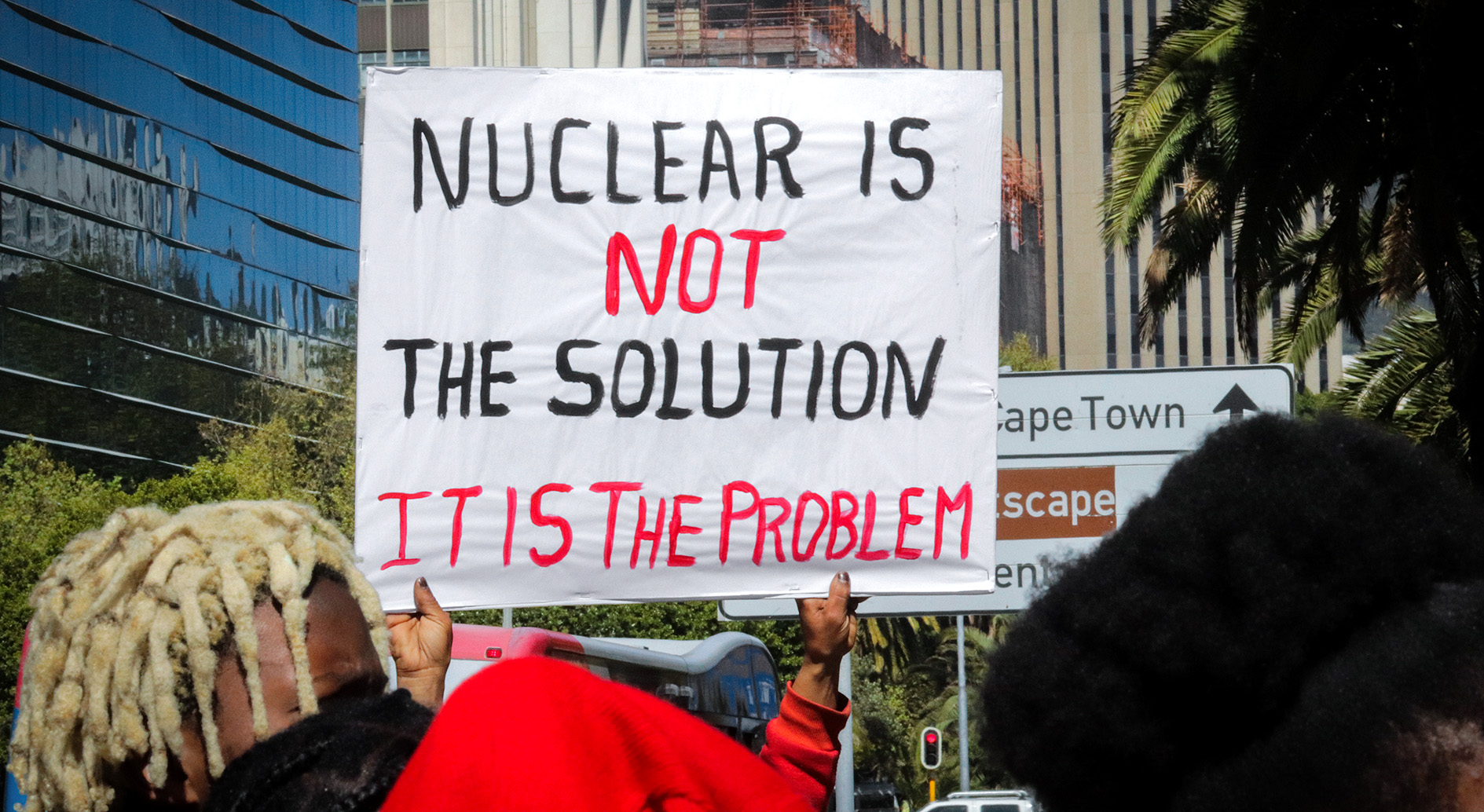
Protesters outside the Southern Africa Oil and Gas Conference in Cape Town, 13 September 2023. (Photo: Ziyanda Duba)
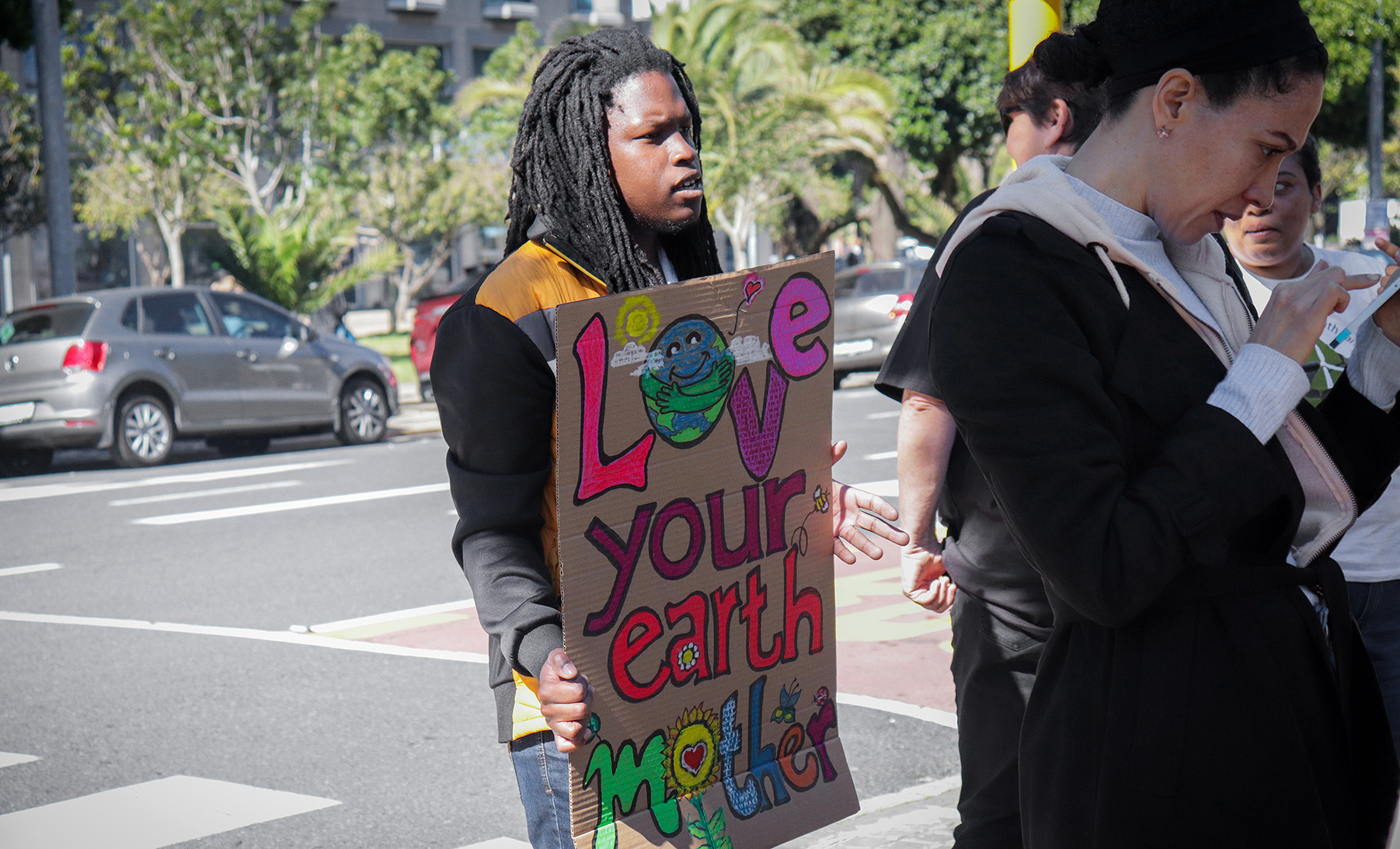
A protester holds a placard calling for climate justice outside the Southern Africa Oil and Gas Conference in Cape Town. 13 September 2023. (Photo: Ziyanda Duba)
In response to the protesters outside and their demands, the acting CEO of the Petroleum Agency SA, Dr Tshepo Mokoka, told Daily Maverick that in this debate there needed to be a separation between the communities affected by explorative oil and gas activities and funded NGOs that might have a particular view that they take to court.
“More space needs to be given for actual communities where these developments will be earmarked to happen, to speak.”
“Communities are saying they want this development. They want the economic activity that comes with it. They want it to be inclusive,” Mokoka said.
Matthew Wingfield, a representative of the Climate Justice Charter, had a different perspective. He said there needs to be clear and deep thought into the kind of employment creation that the oil and gas industry is advocating for and how the communities really feel.
“Who is being made expendable? The people who work in these toxic jobs have no future, they are dying in disproportionate numbers; they’re living in toxic wastelands. The jobs as they would have it are not as positive as they would have us believe,” he said.
“The people that have decided our current moment in South Africa and the [state of the] world don’t care about people and their livelihoods. Certainly not poor people. These [rich and powerful] people will only realise when everything is polluted and the environment is degraded everywhere that this is not a way of living.”
Read more in Daily Maverick: AR6 synthesis report: Warming above 1.5℃ is likely in the near term unless the world acts now, says the UN
Though the debate is seemingly unsettled in South Africa, this journey from high carbon emissions to low carbon emissions is crucially important. This is spelt out in vivid detail in a recent International Institute for Sustainable Development report titled Navigating Energy Transitions: Mapping the road to 1.5°C.
Among its main findings is that, “According to a large consensus across multiple modelled climate and energy pathways, developing any new oil and gas fields is incompatible with limiting warming to 1.5°C.”
Similarly, the International Energy Agency (IEA) in its Emissions from Oil and Gas Operations in Net Zero Transitions report notes that, “Today, oil and gas operations account for around 15% of total energy-related emissions globally, the equivalent of 5.1 billion tonnes of greenhouse gas emissions.”
Fatih Birol, the executive director of the IEA, told The Guardian in 2021: “If governments are serious about the climate crisis, there can be no new investments in oil, gas and coal, from now — from this year.” DM

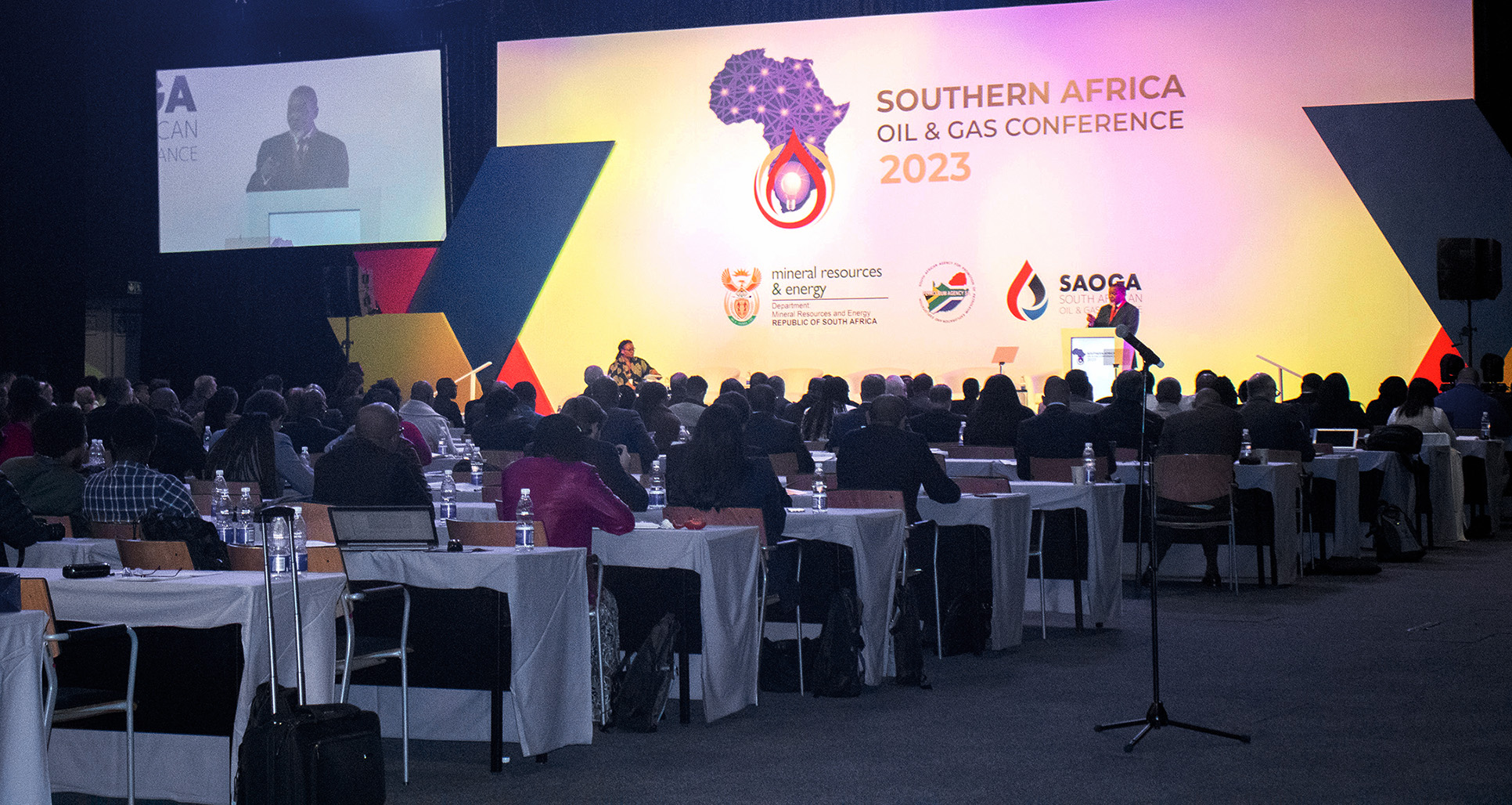


















 Become an Insider
Become an Insider
These so-called activists have no sense of reality or the real world, they have no clue the devastating impact on the economy and country stopping fossil fuels will have – they effectively want to take the country and the world back into the dark ages
And what precisely, are the oil and gas people doing? You know, the ones who knew about climate change forty freaking years ago and kept quiet? Are you one of their praise-singers? Are you in the industry? Sorry, mate, but I believe you as much as I believe Mantashe!
Knew what about climate change exactly? Which climate crisis that never materialised do you want to refer to, the new ice age coming in 10 of the 70’s. the acid rain and hole in the ozone layer that’s going to destroy all plant life in 10 years crisis, the Global Warming crisis of ousted American politicians that will destroy the earth in 10 years of the early 90’s, the all ice is melting and all low-lying land and islands will be gone in 10 years crisis or the current nonsense. The ONLY thing that has come about from all of these manufacture crises is TAXES were increased
and BTW I’ve actually seen the proposed taxes that will be imposed on ALL transportation no matter WHAT fuel will be used (yes even electric) and it is absolutely shocking and horrendous. The supply chain will be VERY hard hit and this will without a doubt be passed onto the consumer i.e. YOU. Don’t believer this crisis nonsense for a moment, that’s the real smoke and mirrors, focus on what the end game is – centralised taxation, not by a country but by a global organisation
Oh yes and who could forget the other “scientist” manufacture crisis – global warming was being sped up by all of the worlds (well mainly the Western World) cows and sheep farting to much and thus creating excess methane gas in the atmosphere that was destroying the ozone
Once again the oil industry spewing pollution. No one believes you, you sound like the McKinsey of oil producers. People and financial institutions are voting with their feet and so are our courts: no more oil slicks
Hahahaha – sorry you’ve swallowed the koolaid
Let me guess, you ardently follow and believe whatever Greta Thunberg trots out, yes the autistic teenager that has been abused and manipulated by her activist parents who have put her in a state of genuine constant fear which is a characteristic of her syndrome y using her to push their radical agenda
You are 100% correct Ben.
“All of us — no exceptions — are accepting that we must move from high carbon emissions to low carbon emissions.”
I’m remaining polite and respectful here but I am going to say to you that you are not doing your job properly because you have ZERO understanding of our atmosphere and the purpose and content of CO2. CO2 levels are driven by the sun and are 0.04% of our atmosphere. WE NEED CO2, it is the GAS OF LIFE. Without CO2 we DIE, it is quite simple to understand. This is why farmers and gardeners pump CO2 into greenhouses and tunnels – TO GROW OUR FOOD!!!!! If you bring CO2 down to “net zero”, we DIE. If you do not understand this, and you continue to push the LIES about CO2, then you are COMPLICIT in the destruction of our food and of humankind.
Thank you
You need to get your facts straight and read more deeply about this issue because your view is way, way too oversimplified. Utter rubbish in fact.
CO2 is sometimes pumped into greenhouses to maintain a balance of CO2 in autumn and early spring if necessary as greenhouses are sealed during this time and may need a CO2 boost during the daytime when CO2 levels drop because of oxygen depletion when vents are not open. This process requires special equipment and monitoring, adding to costs, so is only implemented if beneficial.
Yes, plants need CO2 and light to grow, forming sugars and starches first, then other nutrients including protein, fat and antioxidants. Too much CO2 reduces the amount of protein and other valuable nutrients such as iron, zinc, calcium, magnesium, phosphorous and other trace minerals, as well as Vitamin C that a plant produces.
Too much CO2 reduces photorespiration – growth increases but nutrition value declines drastically, as does the plant’s ability to fend off diseases. Too much CO2 depletes a plant’s ability to take up nitrogen. With less nutrients, insects devour more of the plant to get the same nutritional value. That’s less healthy for humans too.
Warmer temperatures (man-made) also reduce the efficacy of photosynthesis – plants take longer to develop thus use more water.
Carbon dioxide is essential to keep our planet from freezing but concentrations have risen beyond what nature can absorb, because of the burning of fossil fuels. Coal and oil contain carbon that plants pulled out of the atmosphere through photosynthesis over many millions of years; we are returning that carbon to the atmosphere in just a few hundred.
The term ‘zero emissions’ does not mean eliminating CO2 but reducing levels to what natural sinks – land and the oceans – can absorb. Increased CO2 causes our rising temperatures which create extreme weather events such as extended heatwaves and devastating floods caused by excessive rainfall, and acidification of our oceans which in turn threatens marine life.
Let’s stick to the scientific facts.
Fortunately the debate no longer needs to even bother with the environmental impacts. I run solar with storage at factory scale power cheaper and more reliably than grid power of any kind.
That solar plus storage is better for the environment is merely a cherry on top.
I am not advocating that we close existing fossil plants or stop expiring coal. SA is simply too poor to do this. My transition says phase out current fleet, install MASSIVE pumped hydro and MASSIVE wind and solar.
Still not a reliable source for the amount of energy required to keep a nation running. Yes we need a cheaper cleaner source of energy, we just haven’t found it yet, the closest we have as of now is Nuclear. Renewables are NOT stable and consistent enough to ensure a steady supply to industry.
Nuclear is NOT cheaper!!!!!!
It’s cleaner and in the long term it is cheaper than anything else available today. Did you know that many Russian towns and cities receive their power from decommissioned Nuclear submarines and ice breakers? The vessels are ties up in the local harbour, all combat and navigational equipment is stripped out and just the reactor and associated machinery is kept and maintained – they’ve been doing that for decades now
Far more advances have been made in improving the safety and efficiency of nuclear reactors than any other clean energy product (including wind and solar) Gen 4 reactors that include sodium filled fast reactors, very high temperature reactors and molten salt reactors should be ready for commercial use by 2030 and advanced small modular reactors (smaller and even cheaper to manufacture, deploy and maintain) should be coming online within the next decade.
Everyone is crying for reliable clean energy well, nuclear is just that
Ben, my responsibility is to look after a factory complex with 500+ workers that consumes roughly 1300 to 1500 MWh per year. I also need to that affordably because at R10/kWh the businesses are as much toast as they are without power. So, minimal diesel.
Renewables are FAR more predictable than the SA grid! I have solar data for years and while second weekday in August can vary a lot year by year, the variance for the second week is minimal (4%) and the variance for month of August is irrelevant 1%
Renewables are now far cheaper too. Solar at my scale works back to a fixed price of about 76c/kWh. With storage added that increases to about R1.76c/kWh. I paid with connection fees double that on grid power last year. Add this 18% increase and 14% next year and in 2025 by energy is a THIRD of grid power.
It is not my job to solve the national problem. I have already helped them by removing 500kVA demand and more than a GWh from their plate. By late next year I could if I wanted to, cut the cable entirely. It means a bit more solar and bit more battery but for the grid it also means I don’t export to them around 300MWh per year.
Get used to it : climate is no longer part of the fossil versus renewable debate in SA. Money and resilience trumped everything.
Johann I commend you on your initiative and congratulate you in finding a solution for your facility. The issue of fossil fuels goes way beyond that though, remove fossil fuels altogether and what do you have left? Where are plastics going to come from, clothing, electronics and not to even start on transportation. Providing mass electrical supply to nations is only one aspect of the use and our dependence on fossil fuels
If the radicals get their way, how are you going to transport your goods, how are you going to be able to maintain your machinery/equipment, how are you going to communicate. Every fabric of our society and things we need to live the way we live is directly linked to fossil fuels, it’s not going to go away anytime – ever unless we want to return to medieval times.
A world without plastic sounds pretty good to me.
I second that! And fast fashion too which ends up in landfills – a large portion dumped in Ghana.
Ben Harper and LouiseLouise are correct.
Fossil Fuel is the lesser evil,
but it is not linked to/related to/causing Global Climate Change.
Global Climate Change is not caused by humans,
it is caused by the fluctuating temperature of earth’s core,
which is about 100 degrees Celsius.
This takes place over THOUSANDS of years,
and is causing the ebb and flow of our oceans.
Heat travels UP,
not down,
and sunshine rays only penetrate the oceans one (1) kilometer deep!
It is therefor IMPOSSIBLE for the sun to heat the oceans.
Without its core of about 5000 degree Celsius,
the planet will become an ice-ball.
(and if that 5000 degree Celsius sounds familiar,
it is because that temperature is on par with the
surface temperature of the sun.)
Commenting the most doesn’t mean being right!
Amen sister!
100% Alison and Lisbeth commenting on the spokesperson for Gwede Mantashe . Do any of you walk along the sea side.? If you see the plastic that is permanently polluting our seas and shores, you will talk differently. It gets worse day by day. And what about if you come from the clean Western Cape to Gauteng with car or plane and see the dense smoke clouds over the whole of the northern Freestate , Southern Transvaal area. And when you touch down at Oliver Tambo your eyes start to burn. But people living there do not notice it anymore. I have asked people and they don’t notice it. Denise Smit
I’m not quite clear on why Ben Harper & Louise seem to imagine that scientists don’t understand the role that fossil fuels play in the modern economy, but they certainly do. The transition away from fossil fuels is entirely feasible, and energy can still be supplied and expanded through renewable sources – and as pointed out, it is already cheaper than the alternative. More importantly, though is the question of beneficiation, and for all Mantashe’s fossil fuel fundamentalism, he is right in that South Africa needs not just to reap the benefits of development, but also to distribute them better. Unfortunately, his confidence that gas can do this is largely misplaced – quite apart from the very real risk of climate, health and water impacts, fossil fuel beneficiation has a poor history of delivering benefits to local communities of lifting them out of poverty. Moreover, with the rest of the world moving away from fossil fuels, maintaining a high-carbon economy in even the short term (post-20205) will mean increasingly poor access to the global economy for our exports. Whether South Africa can capitalise on the transition to renewables and build in real economic justice in the process is contingent on government embracing it as an approach and thinking about industrialisation and economic investment in these areas… and the current pushback within certain sectors is making that more challenging than it need be.
That’s just not true, the anti-fossil fuel movement decimates jobs and employment, one just needs to look at the huge number of people in the US and Canada that have lost their jobs because of this radical movement. Fossil fuel extraction in SA provides far more jobs than any green initiative ever will and South Africa can least afford to lose tens of thousands more jobs
There are 8-million employess in the US in the renewable energy sector – the fastest growing employment sector in that country.
It is mind boggling that people with limited expertise and even less insight, like Ben and Louise, feel that their gut instinct and home-spun opinions, ill-informed by fossil fuel propaganda, are somehow more valid than the thousands of climate scientists who are now shouting their warning from the rooftops. Read my lips: the science is settled!! We are in danger of runaway climate change and we need to decarbonise at speed to prevent ever more severe heatwaves, floods and breakdown of global food systems that will kill billions. It may already be too late to prevent societal breakdown. Sub saharan Africa, like Asia is extremely vulnerable because people are poor and the world over, political power is mostly held by sociopaths who don’t give a shit. This is a Darwin moment for the entire humanity. But there are still many people, full of their own hubris, narcissism and plain stupidity, who think that they know better!
Spot on Jay!